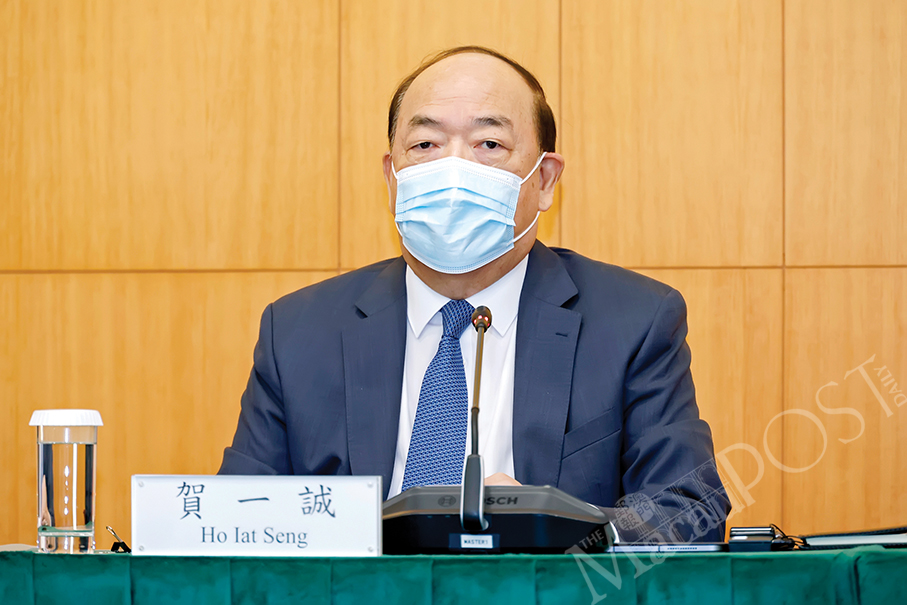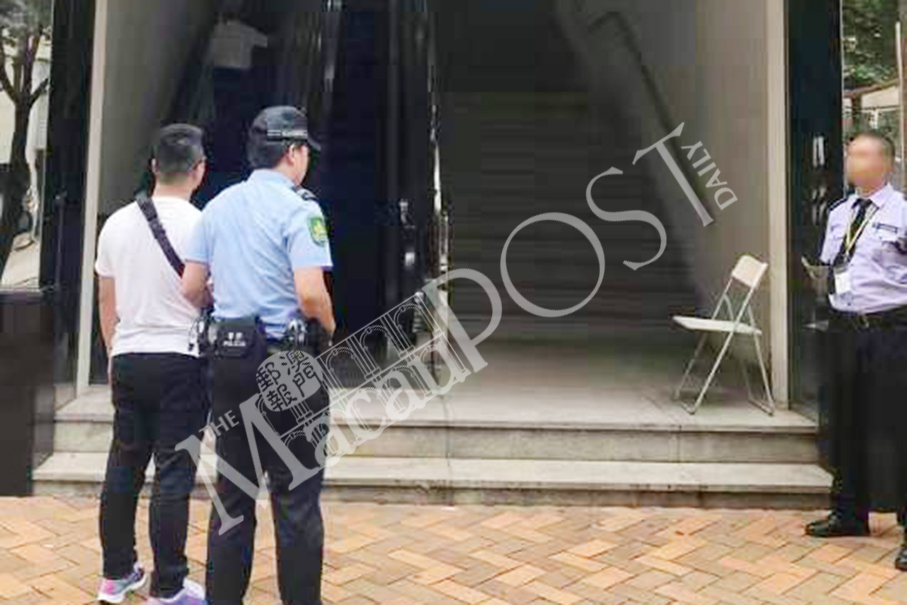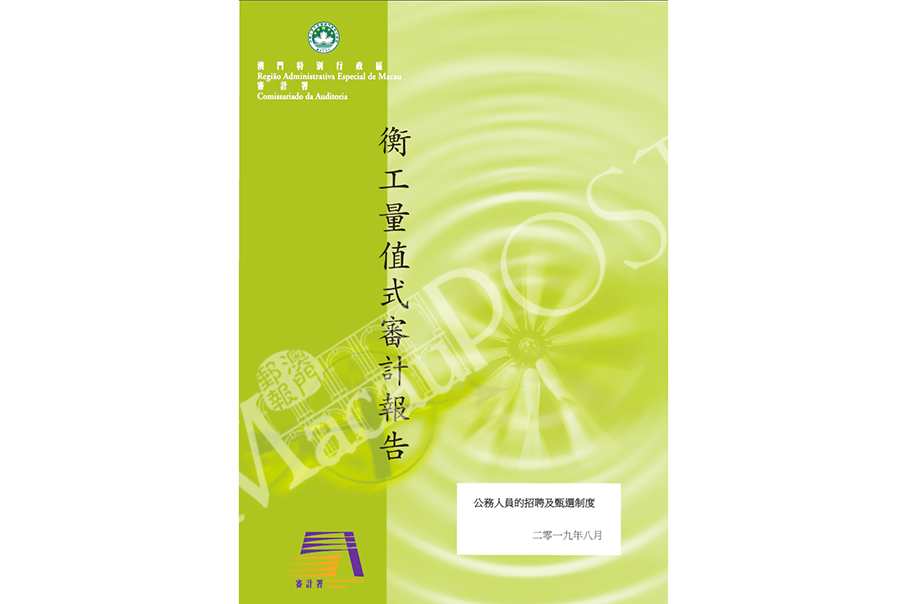Chief Executive Ho Iat Seng has announced that tour groups from the mainland will “very soon” be allowed to visit Macau again, and electronic visas to Macau will also be issued by the mainland authorities again as well, late next month or in early November at the earliest.
Ho made the announcement during a special press conference at Government Headquarters on Saturday morning about his video conference with Vice Premier Han Zheng on Friday afternoon.
Saturday’s press conference, which lasted around 75 minutes, was also attended by Secretary for Administration and Justice André Cheong Weng Chon and Secretary for Economy and Finance Lei Wai Nong.
The organisation of mainlanders’ tour groups, as well as their electronic applications for a travel permit to Macau (the so-called “e-visas”), including for individual travellers, have been suspended since the start of the COVID-19 pandemic in early 2020.
The mainland authorities resumed issuing Individual Visit Scheme (IVS) travel permits to Macau in September 2020. However, since then mainlanders’ travel to Macau based on the Individual Visit Scheme has still been restricted in a way, because the mainland authorities have still not resumed electronic applications for a travel permit to Macau.
Xinhua reported on Friday night that during his meeting with Ho by video link from Beijing, Han, who is also a member of the Standing Committee of the Political Bureau of the Communist Party of China (CPC) Central Committee, voiced the central government’s full support for Macau in speeding up its infrastructure construction and appropriately diversifying its economy.
During Saturday’s press conference, Ho noted that Macau’s economy has been hard hit by the COVID-19 pandemic, admitting that the city is facing considerable difficulties. Ho underlined that the local government’s various financial measures have only been able to support residents in the short term, and only with a continuous economic recovery can civil society eventually return to normality.
Ho noted that during Friday’s video conference, Han listened to his report on Macau’s current economic “difficulties” and his government’s other related work. Ho said during Saturday’s press conference that after Friday’s video conference, the central government had decided to allow mainlanders’ tour groups to visit Macau again and resume the issuing of e-visas for mainlanders to travel to Macau in the near future.
Ho said that the respective airlines, local travel agencies and their counterparts in the mainland will need around one month to prepare for the resumption of mainlanders’ tour groups to Macau. Similarly, Ho said, the mainland authorities will need time to prepare for the resumption of mainlanders’ electronic applications for a travel permit to Macau. Consequently, Ho said, the two measures can get off the ground late next month or in early November at the earliest.
4 provinces, 1 municipality first
Moreover, Ho said that the organisation of mainlanders’ tour groups will be resumed in phases, adding that initially tour groups from Guangdong as well as Fujian, Jiangsu, Shanghai and Zhejiang will be allowed by the mainland authorities to travel to Macau.
Among the four provinces and one municipality (Shanghai), Ho said, Guangdong will certainly be the first one from where tour groups will be allowed to visit Macau again, as the province neighbours Macau, and the Macau government has a better communication mechanism on joint COVID-19 prevention and control with its Guangdong counterparts, compared to other provinces, autonomous regions and municipalities.
40,000 visitors a day
Ho also said that his government expected the number of visitor arrivals to double to 40,000 a day in the near future, thanks to its new arrangements with the central government. Ho noted that the average daily number of visitor arrivals to Macau had stood at around 20,000 in recent days, which he said was “insufficient for sustaining” the city’s tourism sector. The chief executive added that a daily average of 40,000 visitor arrivals could be sufficient for Macau to steadily recover its economy.
Ho also pointed out that Macau received nearly 40 million visitor arrivals in the pre-pandemic year of 2019, or a daily average of around 110,000. He admitted that at that time Macau was struggling to cope with the high number of daily visitor arrivals. Nevertheless, he said, 20,000 visitor arrivals a day was too few, resulting in “inadequate” demand in Macau’s tourism sector.
Reporters asked during Saturday’s press conference whether Ho’s government had set an excessively high target of 40,000 visitor arrivals per day. Ho noted that Macau had over 30,000 visitor arrivals a day on a number of days last year, even without e-visas and tour groups from the mainland at that time.
Ho underlined that a daily number of 40,000 visitor arrivals was the “minimum” number that his government was aiming at. Ho said that the target of 40,000 visitor arrivals per day was not high, and he even thought that the target was conservative.
Ho also said that a daily number of 40,000 visitor arrivals to Macau was “nothing at all” in relation to the mainland’s population of around 1.4 billion. The chief executive also noted that the daily number of 40,000 was just equivalent to an annual number of fewer than 20 million.
Ho asked rhetorically, how can the local government come up with new measures to attract more visitors without setting a target for an average daily number of visitor arrivals?
Ho also noted that the municipality of Shanghai as well as the four provinces of Fujian, Guangdong, Jiangsu and Zhejiang are all populous regions where people enjoy higher spending power, compared to other regions in the mainland. The chief executive also noted that except Shanghai, which was hard hit by an outbreak for a relatively long time early this year, the four provinces have had relatively good “records” in COVID-19 prevention and control since the start of the pandemic in early 2020.
Suspension & resumption mechanism
Ho also said that the local and the mainland’s health authorities will discuss the setting-up of a mechanism for suspending tour groups’ travel to Macau in case of a serious COVID-19 outbreak in Macau or one of the four provinces or Shanghai that will be initially covered by the eased travel arrangements.
Similarly, Ho said, the two sides will establish a mechanism for resuming tour groups’ travel to Macau after a specific number of days after the respective COVID-19 outbreak is over. With such a resumption mechanism in place, Ho said, the Macau government will not need to apply to the central government for the resumption of tour groups to Macau after an outbreak is over every time.
Ho also pointed out that, for instance, Macau and Zhuhai have a well-functioning mechanism for suspending and resuming quarantine-free travel arrangements. Ho noted that it took Macau 35 days to reach zero community cases during its latest COVID-19 outbreak that began on June 18, and Zhuhai lifted its hotel quarantine for arrivals from Macau in early August, i.e., 40 days or so after the start of the outbreak, which is also known in Chinese as 618 outbreak.
‘No conditions’ for dropping COVID-19 prevention
Meanwhile, Ho also underlined that for the time being – unlike Hong Kong – Macau will not cancel its mandatory hotel quarantine for arrivals from outside the Chinese mainland. He stressed that the Macau government’s current arrangement of “7+3” will be maintained for the time being, i.e., seven days of hotel quarantine followed by three days of self-health management.
During Saturday’s press conference, Ho repeatedly underlined Macau’s need to always implement COVID-19 measures that are “consistent” with the mainland’s ones, i.e., sticking to the dynamic zero-COVID policy.
Only with Macau implementing the same COVID-19 measures as in the mainland, can the central government resume tour groups’ travel and e-visas to Macau, Ho said.
Ho pointed out that only if Macau continues to carry out its COVID-19 measures “consistent” with the mainland, can the quarantine-free travel arrangements between Macau and the mainland be maintained. Ho also noted that mainlanders account for the largest number of Macau’s visitors.
Ho also underlined Macau’s close links with the mainland, pointing out that currently, on average, around 300,000 entries and exits by residents, non-resident workers and visitors are recorded between Macau and the mainland every day. The chief executive asked rhetorically whether local residents are willing to be subject to a “7+3” arrangement whenever they travel to the mainland.
Consequently, Ho underlined that Macau “has no conditions” for no longer implementing COVID-19 prevention and control measures.
Ho also said that he would not comment on Hong Kong’s decision on Friday to drop its mandatory hotel quarantine for all arrivals. Hong Kong’s new “0+3” arrangement starts today.
According to official figures, Macau received 39.4 million visitor arrivals in 2019, with mainlanders accounting for 71 percent of the total. Last year, the number of total visitor arrivals stood at 7.7 million, 91 percent of whom were from the mainland.
The Macau government imposed its blanket entry ban on non-resident foreigners in March 2020. The Macau government started to gradually ease its COVID-19 entry restrictions for foreigners last year, and since this summer it has intensified the relaxations.
No new land leases for gaming operators
Meanwhile, while Cheong announced during Saturday’s press conference that the government will hold individual meetings from this week with each of the seven bidders for Macau’s up to six gaming concessions, Ho stressed that no new land leases will be granted to Macau’s gaming concessionaires.
The new gaming concessions valid for up to 10 years are slated to start on January 1 next year.
Meanwhile, Ho also pointed out that he and Han also discussed further cooperation in developing the Guangdong-Macau In-Depth Cooperation Zone in Hengqin, which was set up about a year ago. Ho said that the zone’s development in its first year was a success.

Chief Executive Ho Iat Seng addresses Saturday’s press conference at Government Headquarters about his Friday video conference with Vice Premier Han Zheng. – Photo: GCS








